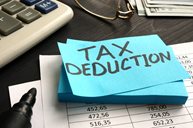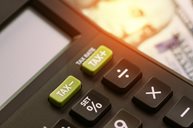How to Claim Car Related Tax Deductions
If you use your car for work purposes, you're entitled to claim the costs related to this – but only if you personally own the car you are using for this work. If your car is owned by your employer or is part of your salary package, then you are unable to claim anything.
If you do own your car, then there are two methods you can use to claim any car-related expenses:
METHOD 1: CENTS PER KILOMETRE
-
Your claim by this method is based on a set rate for each business kilometre you travel. Under this method you are eligible to claim up to a maximum of 5,000 kilometres per year, per vehicle
-
If you travel in excess of 5,000 kilometres this method of claim may not be appropriate to you. You may be better off using the logbook method.
-
The claim value is calculated by multiplying the total business kilometres traveled (limited to 5,000 per vehicle) by the standard rate of 88 cents per kilometre for the 2025 tax year. This figure takes into account all the vehicle running expenses (including depreciation)
-
You do not need written evidence, however you need to be able to demonstrate that you have covered the kilometres claimed. A diary of work-related journeys (including the kilometres traveled) will suffice.
METHOD 2: LOGBOOK
Your claim by this method is based on the business use percentage of each car expense. This is determined by a log book that must have been kept for at least a 12 week period, and must be updated every five years. Through your logbook you can claim all expenses that relate to the operation of the car at your percentage of business use
The logbook must record all business journeys made in the car over the 12 week period that it records, detailing:
-
When the log book period begins and ends
-
The car's odometer readings at the start and end of the period
-
The total kilometres traveled
- The business percentage for the logbook period
For each journey in the logbook, you must record:
- Date of journey
-
Odometer readings at the start and end of the journey
-
Kilometres traveled
-
Reasons for the journey
-
If you make two or more journeys in a row on the same day you can record them as a single journey
You will need to keep all receipts throughout the year to justify your claim, such as insurance, servicing and repairs. Petrol can be estimated using the start and end odometer readings for the year, indicating the total kilometres traveled.
Depreciation is calculated as 25% of the written down value of the car (using the 'diminishing value' method).
Remember, if your car is provided by your employer, or is part of your salary package, you cannot claim any of the costs.
If you use someone else's car or another vehicle (that is not defined as a car) for work purposes, you will not be able to use the set rate method to claim your expenses. You will be able to claim your business use percentage of the actual expenses you incurred. You will need receipts for all expenses (including fuel) and you will need to establish your business use percentage (from a logbook or some other record).
For vehicles that do not fit the definition of a car, the depreciation rate will be different to that of a car. For a ute with a payload of 1 tonne or more, or a vehicle designed to carry 9 or more passengers, the depreciation rate will be 26.67%, while for a motorcycle the depreciation rate will be 28.57%, using the diminishing value method.
ELECTRIC CARS
If your car is electric, instead of keeping receipts for fuel and oil, you must keep:
- Receipts for electricity from commercial charging stations
- Evidence that shows you incur electricity costs to charge your car at home, such as an electricity bill and how you calculated the direct cost of charging your car
- Odometer readings for the start and the end of the period that you are claiming.
Alternatively, you can use the electric vehicle (EV) home charging rate of 4.2c per kilometre to make a reasonable estimate of your home charging expenses based on your odometer readings. If you choose to use this rate but you also used commercial charging stations to charge the car during the income year, you must disregard your commercial charging station costs. They can't be claimed as a separate deduction.
HYBRID CARS
If your car is a hybrid, instead of keeping receipts for fuel and oil expenses you must keep all of the following:
- Receipts for your fuel and oil
- Receipts for commercial charging stations
- Evidence that shows you incur electricity costs to charge your car at home, such as an electricity bill and how you calculated the direct cost of charging your car
- Odometer readings for the start and the end of the period that you are claiming.
You can't use the EV home charging rate if the car you own and use for work is a hybrid.
WHAT YOU CANNOT CLAIM
You cannot claim the cost of normal trips between home and work because the travel is private, even if:
- You do minor tasks on the way to work, such as picking up the mail
- You travel back to work for a security call out or parent teacher interviews or if you are required to travel to and work more than once a day as you work a ‘split shift’
- You work overtime or shift work and no public transport is available to get you to and / or from work
- You live a long distance from your usual place of work
WHAT YOU CAN CLAIM
In limited circumstances, you can claim the cost of trips between home and work, where:
- You had shifting places of employment (that is, you regularly work at more than one site each day before returning home)
- You carry bulky tools or equipment for work and all of the following apply:
- The tools or equipment are essential to perform your employment duties and you don't carry them merely as a matter of choice
- The tools or equipment are bulky – meaning that because of their size and weight they are awkward to transport and can only be transported conveniently by the use of a motor vehicle
- There is no secure storage for such items at the workplace
- Your home is was your base of employment (that is, you were required to start certain work activities at home and travel to a workplace to complete this activities).
You can also claim a deduction for car expenses if you use your car to:
- Perform your work duties
- Attend work-related conferences or meetings away from your normal workplace
- Travel directly between 2 separate places of employment if neither of the places is your home
- Travel from your normal workplace to an alternative workplace and return to your normal workplace or home
- Travel from your home to an alternative workplace, then to your normal workplace or home
Your travel records do not need to be kept in a traditional logbook, as long as the necessary information is kept. A spreadsheet is sufficient, or there are apps available that will allow you to easily record the necessary details.
This information sheet is intended as a guide for H&R Block clients. All actual detail and circumstances differ, so please discuss your situation with an H&R Block Tax Consultant. Remember to keep all your receipts and documents for the year. The H&R Block ReceiptHub will assist you to keep your records in order. Remember – if you are not sure if you can claim an expense, keep the receipt and we will ensure that we claim all allowable deductions and rebates for you whilst preparing your tax return.
H&R Block is Australia’s largest network of tax accountants with over 400 offices. Every year we help thousands of Australians achieve a better taxation result. For you nearest office call 13 23 25.
Updated June 2025




.png?width=55&height=48&ext=.png)
-1.svg)

